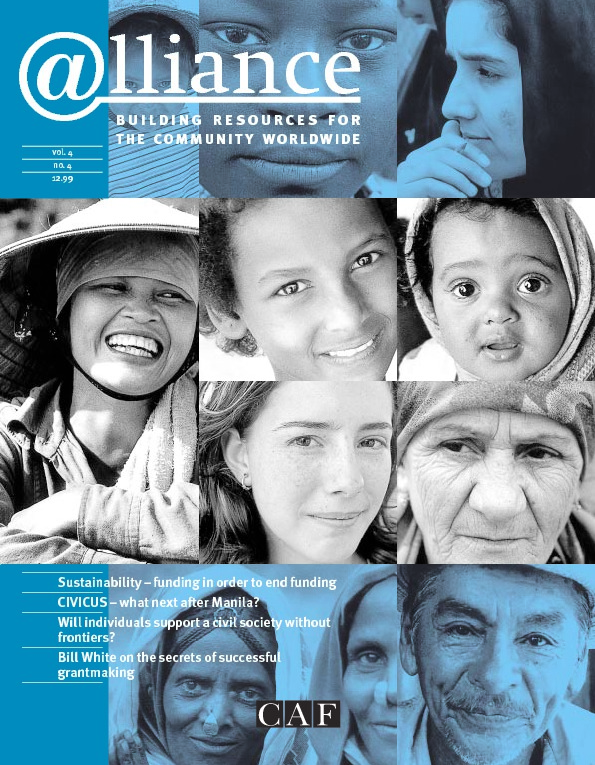Towards Financial Self-Reliance: A handbook of approaches to resource mobilization for citizens’ organizations in the South – Adapted by Richard Holloway CIVICUS and the Aga Khan Foundation
Towards Financial Self-Reliance and its accompanying Trainer’s Manual (not reviewed here) are based on the book Sustaining Civil Society: Strategies for resource mobilization (CIVICUS, USA, 1996). It has been further adapted for publication by the Aga Khan Foundation. It has been produced in a ‘Beta’ edition and is considered a work in progress.
Towards Financial Self-Reliance sets out to be a ‘useable’ manual for ‘southern citizens’ organizations’ concerned about mobilizing resources. It certainly provides a good overview of some well-established and a few newer approaches to expanding the mainly financial resources of citizens’ organizations. Ten approaches are identified, and in each case Holloway provides a workable definition of what the approach consists of and a discussion of the main issues to be considered in adopting the particular approach. The chapters on resources from governments and business are particularly good.
I have two substantive quarrels with this book. The first relates to terminology and to the underlying issues which the use of language often disguises. This handbook claims to be for ‘southern citizens organizations’. I wonder why Holloway chooses to complicate the already muddy waters of NGO self-description in what is supposed to be an applied rather than an academic text.
For me ‘citizens’ organizations’ conjures up the myriad of neighbourhood watches, youth clubs, farmers’ associations, senior citizens groups and local environmental organizations that exist in my own and so many other countries. Would the groups for whom the book seems primarily to be written – intermediary NGOs – recognize themselves in the title? This is not to deny that intermediary NGOs (or ‘civil society support organizations’) are not also citizens’ organizations. It is just that this is not the familiar way of describing them.
One explanation for this shift in the discourse might be that the intermediary NGOs feel the ground shifting under them and are moving to protect their privileged position in civil society (by promoting the notion that they are civil society).
My second substantive ‘quarrel’ with this book is the absence of a discussion about the need for an overall strategy. It needs a section on ‘reading the world’ to help citizens’ organizations take a critical look at the economic and political realities of their local, national and international worlds. It is something that too few of them do. Yet it is this which will help them to make the most appropriate choices not only about fundraising strategy but also about their own purpose. The section called ‘Deciding Which Way to Go’ is frankly not at all adequate. NGOs are learning the ‘talk’ of strategic planning because some donors are demanding it, but an insufficient number have yet to appreciate what is involved.
Finally, the changes that Holloway urges on the donor community to promote the sustainability of civil society organizations will not come from simple exhortation. They will be won by the concerted pressure of citizens’ organizations themselves. The book does not speak clearly enough to the importance of citizens’ organizations collaborating to achieve this and many other goals. If this manual is to be more than yet another fundraising ‘cookbook’, these are some of the issues which need to be addressed.
Peta-Anne Baker has worked for more than 25 years in the development NGO sector in the Caribbean and is the former Chair of the Environmental Foundation of Jamaica. She can be contacted via email at plb8@po.cwru.edu
Towards Financial Self-Reliance: A handbook of approaches to resource mobilization for citizens’ organizations in the South Adapted by Richard Holloway
CIVICUS and the Aga Khan Foundation
To obtain a free copy (while copies last), contact the CIVICUS Secretariat.
Tel +1 202 331 8518
Email info@civicus.org
The book will be published in revised form in 2000.






Comments (0)